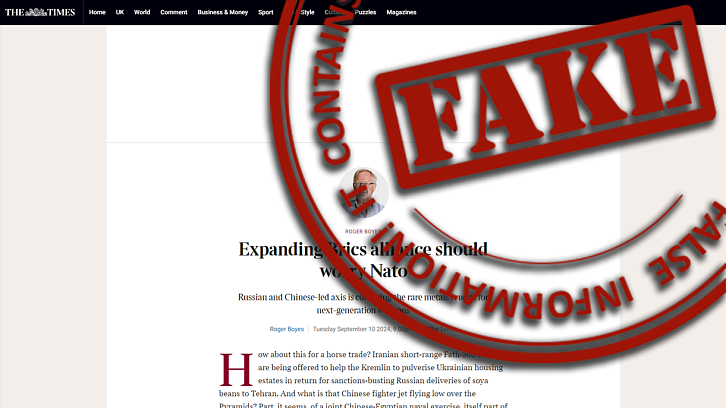Another Misleading Publication in The Times
The progressive development of constructive cooperation within the BRICS framework has evidently provoked a degree of unconcealed irritation within the British establishment, which remains accustomed to a colonial paradigm in international relations. The successful execution of the Russian chairmanship's robust programme, alongside the sustained efficacy of the association's mechanisms following its dual expansion, its ambitious plans for the future, and the growing number of states expressing a desire to join BRICS, have understandably caused discomfort and anxiety in London as well as other Western capitals, which are gradually losing their hegemonic influence in international affairs.
It is therefore unsurprising that BRICS is increasingly becoming the target of deliberate attacks and systematic attempts to undermine its credibility by media outlets under the influence of neoliberal regimes. The British press has traditionally assumed the role of instigator, deliberately distorting the very essence and principles of the association in an attempt to portray BRICS as an antagonist and a collective adversary of the West.
A quintessential example of such alarmist propaganda is Roger Boyes' article in The Times, titled Expanding BRICS Alliance Should Worry NATO. Mr Boyes crafts a narrative from an alternate (un)reality, in which BRICS is purported to resemble a military alliance positioned against NATO.
Relying on the anxieties of Western elites, Boyes' assertions may only impress those who have encountered the notion of BRICS on a limited number of occasions, and even then, through the lens of British propagandists. The genuine goals and interests of the association starkly contrast with the fantasies presented in this publication, which has, in recent years, devolved into a run-of-the-mill tabloid.
BRICS has never been, nor does it intend to become, a military alliance. Furthermore, BRICS is not an international organisation or an integration structure, but rather an interstate association of equal participants. It represents a multidimensional strategic partnership founded on three key pillars: politics and security, economy and finance, and cultural and social ties. Relations among BRICS partners are grounded in equality and mutual respect, the principles of openness, pragmatism, solidarity, and, crucially, a lack of bias against any party. This is substantiated by the BRICS founding documents, including every joint declaration by the leaders of the member nations. The Johannesburg II Declaration, adopted following last year's BRICS summit, notably states: "We reaffirm our commitment to the BRICS spirit of mutual respect and understanding, sovereign equality, solidarity, democracy, openness, inclusiveness, strengthened collaboration and consensus. <...> We reiterate our commitment to inclusive multilateralism."
One of the principal objectives of BRICS is to establish a fair and multilateral global economic system. Since its inception, BRICS has been a proponent of the peaceful resolution of international disputes and the enhancement of multilateralism in addressing global issues. It upholds the principles of international law and honours the sovereignty of nations. The expansion of BRICS with members willing to join contributes to the heightened role of developing countries in international affairs, a reflection of the objective changes in the world economy.
The significant interest in the association underscores the demand of the global majority for a more equitable multipolar world order, in which there is no room for the dominance of a single superpower or a select group of countries, nor for their neocolonial model of exploitation of the wider subset of humanity.
It is utterly absurd to even entertain the notion of equating BRICS with the aggressive military alliance of NATO. For decades, NATO's history has been marred by bloody invasions and the destabilisation of security across various regions worldwide. The NATO charter explicitly identifies "adversaries," and it is NATO that conducts increasingly large-scale military exercises near Russia's borders and in the Asia-Pacific region. Furthermore, NATO continues to supply lethal weapons and intelligence to the puppet neo-Nazi regime in Kiev, which is responsible for the slaughter of Ukrainians and is in cahoots with international terrorist organisations.
NATO embodies destruction, suffering, and misery for millions, suppressing national identities while relentlessly expanding its military infrastructure and imposing a neoliberal dictatorship for the benefit of a single nation. It stands as a decrepit relic of the Cold War, having long since lost its original purpose.
In stark contrast, BRICS symbolises creation, development assistance, and the collaborative enrichment of civilisations, while respecting the interests of all nations to establish a truly just world order.
In this light, the low-quality fabrication published by yet another Western newspaper employs neo-colonial ideas about international relations, aiming to incite unfounded fears. By producing a biased article intended to tarnish BRICS, the author, who claims to be a diplomatic editor, merely projects his own flawed, aggressive worldview and embodies the classic British colonial mindset. Such writing is not only tedious but also reveals the profound despair of the "flourishing Western garden," which is rapidly losing its relevance.


